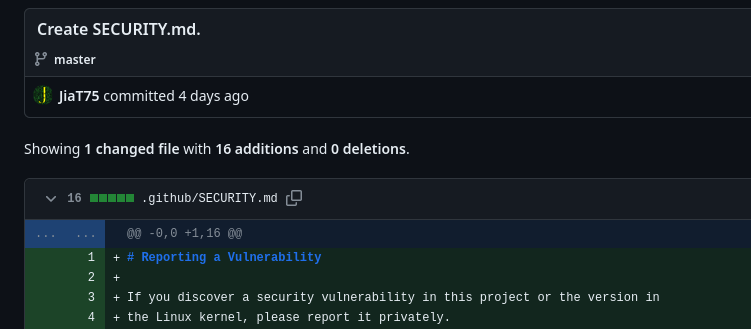And you know what? Doing updates once a week saved me from updating to this version :)
Linux
From Wikipedia, the free encyclopedia
Linux is a family of open source Unix-like operating systems based on the Linux kernel, an operating system kernel first released on September 17, 1991 by Linus Torvalds. Linux is typically packaged in a Linux distribution (or distro for short).
Distributions include the Linux kernel and supporting system software and libraries, many of which are provided by the GNU Project. Many Linux distributions use the word "Linux" in their name, but the Free Software Foundation uses the name GNU/Linux to emphasize the importance of GNU software, causing some controversy.
Rules
- Posts must be relevant to operating systems running the Linux kernel. GNU/Linux or otherwise.
- No misinformation
- No NSFW content
- No hate speech, bigotry, etc
Related Communities
Community icon by Alpár-Etele Méder, licensed under CC BY 3.0
This also affects Fedora 40 and Fedora Rawhide - https://discussion.fedoraproject.org/t/warning-malicious-code-in-current-pre-release-testing-versions-variants-f40-and-rawhide-affected-users-of-f40-rawhide-need-to-respond/110683
If you're using xz version 5.6.0 or 5.6.1, please upgrade asap, especially if you're using a rolling-release distro like Arch or its derivatives. Arch has rolled out the patched version a few hours ago.
Dang, Arch never sleeps, does it? That's a 24/7 incident response squad level of support.
Backdoor only gets inserted when building RPM or DEB. So while updating frequently is a good idea, it won't change anything for Arch users today.
Gentoo just reverted back to the last tar signed by another author than the one seeming responsible for the backdoor. The person has been on the project for years, so one should keep up to date and possibly revert even further back than just from 5.6.*. Gentoo just reverted to 5.4.2.
Is this only happened with SSH, or other network facing services using liblzma too?
We know that sshd is targeted but we don't know the full extent of the attack yet.

They noticed that some ssh sessions took 0.5 seconds too long under certain circumstances. 😲
Holy hell that's good QA.
Microsoft employee.
Definitely not from the team working on search on Windows then.
Reading the comments here https://news.ycombinator.com/item?id=39865810 it appears that libarchive may be tainted as well.
This is pretty insane. Can't wait for the Darknet Diaries on this one.
Damn, it is actually scary that they managed to pull this off. The backdoor came from the second-largest contributor to xz too, not some random drive-by.
They've been contributing to xz for two years, and commited various "test" binary files.
It's looking more like a long game to compromise an upstream.
Either that or the attacker was very good at choosing their puppet…
Well the account is focused on one particular project which makes sense if you expect to get burned at some point and don't want all your other exploits to be detected. It looks like there was a second sock puppet account involved in the original attack vector support code.
We should certainly audit other projects for similar changes from other psudoanonymous accounts.
Yeah, and the 700 commits should be reverted… just in case we missed something.
Time to audit all their contributions although it looks like they mostly contribute to xz. I guess we'll have to wait for comments from the rest of the team or if the whole org needs to be considered comprimised.
ELI5 what does this mean for the average Linux user? I run a few Ubuntu 22.04 systems (yeah yeah, I know, canonical schmanonical) - but they aren’t bleeding edge, so they shouldn’t exhibit this vulnerability, right?
apt info xz-utils
Your version is old as balls. Even if you were on Mantic, it would still be old as balls.
The average user? Nothing. Mostly it just affects those who get the newest versions of everything.
In this case I think that's just Fedora and Debian Sid users or so.
The backdoor only activates during DEB or RPM builds, and was quickly discovered so only rolling release distros using either package format were affected.
Time to bring back the reproducible build hype
Why didn't this become a thing? Surely in 2024, we should be able to build packages from source and sign releases with a private key.
It's becoming more of a thing but a lot of projects are so old that they haven't been able to fix their entire build process yet
Won't help here; this backdoor is entirely reproducible. That's one of the scary parts.
The backdoor wasn't in the source code, only in the distributed binary. So reproducible builds would have flagged the tar as not coming from what was in Git
Reproducible builds generally work from the published source tarballs, as those tend to be easier to mirror and archive than a Git repository is. The GPG-signed source tarball includes all of the code to build the exploit.
The Git repository does not include the code to build the backdoor (though it does include the actual backdoor itself, the binary "test file", it's simply disused).
Verifying that the tarball and Git repository match would be neat, but is not a focus of any existing reproducible build project that I know of. It probably should be, but quite a number of projects have legitimate differences in their tarballs, often pre-compiling things like autotools-based configure scripts and man pages so that you can have a relaxed ./configure && make && make install build without having to hunt down all of the necessary generators.
Time to change that tarball thing. Git repos come with built in checksums, that should be the way to go.
The back door is not in the source code though, so it's not reproducible from source.
Part of the payload was in the tarball. There was still a malicious shim in the upstream repo
This is a fun one we're gonna be hearing about for a while...
It's fortunate it was discovered before any major releases of non-rolling-release distros were cut, but damn.